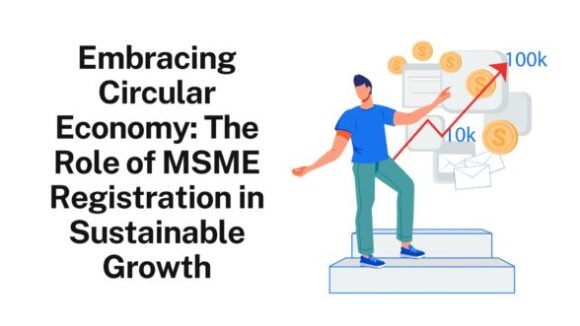Micro, Small, and Medium Enterprises (MSMEs) constitute the backbone of many economies worldwide. They are not only crucial for employment generation but also for fostering innovation and economic growth. In recent years, the concept of a circular economy has gained prominence as a sustainable alternative to traditional linear economic models. Udyam Registration plays a pivotal role in promoting circular economy principles, paving the way for a more resilient and sustainable future.
Advancing Sustainable Practices Through MSME Registration
MSME registration serves as a gateway for businesses to formalize their operations and access various benefits, including financial assistance, technical support, and market linkages. By incentivizing MSMEs to adopt circular economy practices during the registration process, governments can encourage resource efficiency, waste reduction, and eco-friendly production methods. This can lead to significant environmental benefits, such as reduced carbon emissions, minimized waste generation, and conservation of natural resources.
Driving Innovation and Collaboration
Embracing circular economy principles requires innovation and collaboration across industries. MSME registration facilitates networking opportunities and collaboration among businesses, research institutions, and government agencies, fostering a conducive ecosystem for sustainable development. Through knowledge sharing, technology transfer, and joint initiatives, MSMEs can leverage their collective expertise to develop innovative solutions for circular product design, remanufacturing, and waste management.
Overcoming Challenges and Building Capacity
While the benefits of adopting circular economy principles through MSME registration are clear, challenges remain. Many MSMEs may lack the necessary knowledge, resources, or incentives to embrace sustainable practices fully. Governments, in partnership with industry associations and development organizations, can address these barriers by providing capacity-building programs, technical assistance, and financial incentives tailored to the needs of MSMEs. By empowering MSMEs with the tools and support they need to transition to circular business models, governments can accelerate the shift towards a more sustainable economy.
Promoting Market Demand for Sustainable Products
Consumer awareness and demand for sustainable products are driving forces behind the transition to a circular economy. MSME registration can play a vital role in fostering market demand for eco-friendly goods and services by incentivizing businesses to prioritize sustainability in their operations. Governments can introduce policies that reward MSMEs for adopting sustainable practices, such as eco-labeling schemes, tax incentives, or preferential procurement programs. By aligning economic incentives with environmental goals, MSME registration can stimulate market demand for sustainable products and services, creating a virtuous cycle of innovation and adoption.
Embracing Digitalization for Circular Business Models
Digital technologies have the power to revolutionize MSMEs’ ability to embrace circular economy principles. MSME registration processes can be streamlined and digitized, making it easier for businesses to comply with regulatory requirements and access support services. Additionally, digital platforms can facilitate the exchange of resources, equipment, and expertise among MSMEs, enabling them to collaborate on circular initiatives and optimize resource utilization. By harnessing the power of digitalization, MSME registration can accelerate the transition to a circular economy and unlock new opportunities for sustainable growth.
Harnessing Circular Supply Chains for Resilience
Circular supply chains are essential components of the circular economy, enabling businesses to optimize resource use, reduce waste, and enhance resilience to external shocks. MSME registration can facilitate the integration of circular principles into supply chain management by promoting collaboration and transparency among stakeholders. By requiring MSMEs to disclose information about their supply chains during the registration process, governments can incentivize the adoption of sustainable sourcing practices, such as using recycled materials or partnering with local suppliers. This not only reduces the environmental footprint of MSMEs but also strengthens their resilience to supply chain disruptions, such as raw material shortages or price fluctuations.
Empowering Local Communities Through Circular Practices
MSMEs are often deeply embedded within local communities, playing vital roles in job creation, wealth generation, and social cohesion. By promoting circular economy principles through MSME registration, governments can empower local communities to become more self-reliant and resilient. For example, MSMEs can adopt circular business models that prioritize repair, reuse, and sharing, thereby reducing reliance on imported goods and fostering a culture of resourcefulness and innovation. Additionally, governments can support community-based initiatives, such as recycling cooperatives or repair cafes, that enable residents to actively participate in the circular economy and contribute to local economic development.
Enhancing Access to Finance for Circular Ventures
Access to finance is a significant barrier for MSMEs looking to transition to circular business models, as traditional lenders may be reluctant to finance innovative or unconventional projects. MSME registration can help address this challenge by providing a formal platform for businesses to demonstrate their commitment to sustainability and present their circular business plans to investors. Governments can support this process by creating dedicated financing mechanisms, such as green bonds or impact investment funds, that prioritize circular ventures and offer favorable terms to MSMEs. By facilitating access to finance for circular initiatives, MSME registration can unlock new opportunities for innovation, job creation, and economic growth while advancing the transition to a more sustainable economy.
Fostering Innovation Through Circular Business Models
One of the key advantages of embracing circular economy principles through MSME registration is the stimulation of innovation. Circular business models encourage businesses to rethink traditional approaches to production, consumption, and waste management. By requiring MSMEs to integrate circularity into their registration process, governments can foster a culture of innovation, encouraging businesses to develop new products, services, and processes that minimize waste, extend product lifecycles, and promote resource efficiency. This not only drives economic competitiveness but also positions MSMEs as leaders in sustainability, attracting consumers who prioritize environmentally responsible products and services.
Leveraging Technology for Circular Solutions
Technology plays a pivotal role in enabling the transition to a circular economy. MSME registration can serve as a platform for leveraging technology to develop and deploy innovative circular solutions. For example, digital platforms can facilitate the exchange of surplus materials and equipment among MSMEs, enabling them to reduce waste and optimize resource use. Similarly, blockchain technology can enhance transparency and traceability within supply chains, enabling businesses to verify the origin and sustainability credentials of their products. By promoting the adoption of digital technologies through MSME registration, governments can empower businesses to overcome barriers to circularity and unlock new opportunities for sustainable growth.
Suggested Read- Udyam Registration Status Verification
Conclusion: Shaping a Sustainable Future
In conclusion, MSME registration catalyzes promoting circular economy principles and driving sustainable growth. By integrating environmental considerations into the registration process, governments can encourage MSMEs to adopt eco-friendly practices that not only benefit the planet but also enhance their long-term competitiveness and resilience. As we navigate the challenges of the 21st century, embracing a circular economy mindset is essential for building a more sustainable and prosperous future for generations to come. Through concerted efforts and collaboration, MSMEs can lead the way towards a more sustainable and resilient economy, where waste is minimized, resources are optimized, and prosperity is shared equitably.




